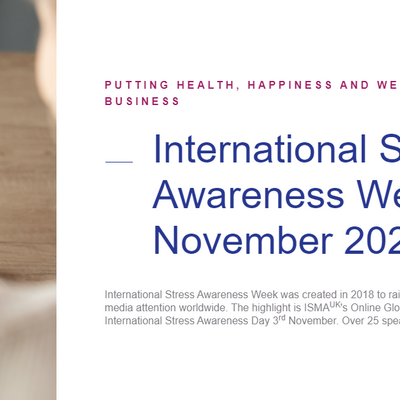International Stress Awareness Week (1st – 5th November) and National Stress Awareness Day (3rd November) aim to highlight the ways that stress can affect us and how it can be managed before it becomes a problem.
Millions of people in the UK experience stress. According to the Mental Health Foundation, at some point in the past year, unsurprisingly given recent global events, 74% of us have felt so stressed that we’ve felt unable to cope.
A little bit of stress can help you stay focused, energetic, enable you to meet challenges at work and get tasks completed. However, too much stress can result in people feeling like they’re under too much mental or emotional pressure.
One of the biggest sources of potential stress is the workplace, from meeting the daily demands and responsibilities of a job to long hours, mounting emails and tight deadlines.
These things can lead to people feeling worried, drained and overwhelmed and, when stress exceeds your ability to cope, it stops being helpful and starts causing damage to your mind, body and, ultimately, your job satisfaction.
If job stress is impacting your work performance, health, or personal life, it’s time to take control. This is why we’ve compiled our top tips about how to deal with day-to-day office stresses.
Allocate specific time to check emails
We’re all familiar with that anxious feeling we get as emails come through thick and fast and your inbox gets increasingly full. You don’t have to be a slave to opening, reading and actioning them the moment they come through though as this will only lead to your to do list getting longer as the day goes on.
Instead, turn off your notifications and schedule a regular time to check them twice a day so you don’t get too overwhelmed. Doing this will give you the headspace and a designated window of opportunity to deal with them efficiently and all in one go.
Stick to a routine
Try to start and leave at the same time each day. This means that you’ll know exactly what you need to do in the morning before work and what time roughly you’ll be home. This is a great approach for getting to grips with managing your domestic responsibilities, all while striking that all-important work/life balance.
Don’t be afraid to say no
If you feel like you’re stretched too thin and the work keeps on pouring in, take a deep breath and try to have the power to say no. This won’t mark you out as weak or lazy. Simply explain that, ordinarily, you would be more than happy to take on the task but you’re already working on multiple projects. Counter a no with the caveat that you can jump on something once your desk, and headspace, is more clear.
If you’re really struggling to manage your workload and the issues are long ongoing, book a face-to-face meeting with your manager so that you can find a way to resolve any issues. This has the double benefit of being good for your morale while helping the business achieve its goals.
Make time for lunch
Try not to skip your midday meal as feeling hungry will only make you feel more stressed as you tackle your afternoon tasks. Also use the time to take a screen break and try to do some exercise if possible. It doesn’t have to be a trip to the gym. A brief walk or gentle bike ride is the perfect way to get your body moving, blood pumping and endorphins flowing, while the fresh air will be sure to shake off the cobwebs.
Switch off when you’re OOO
The last thing you want is to let the lines between your personal and professional life become blurred. This is why you need to be decisive and log on and off at the same times each day. That evening email can wait until the following morning and switching off will allow your brain to have a break from what it associates with office based duties.
Have a plan in place
Having a plan and sticking to it can be crucial when it comes to managing stress levels on a busy day. Try not to jump haphazardly from task to task and look at the bigger picture of what needs to be done today, tomorrow and this week. You might want to start with your easiest tasks to warm up and gain confidence or tackle the harder jobs first if you’re worried about them. Try to group similar tasks to avoid wasting time when switching up what you’re doing. This type of planning will help you to better manage your time and energy.
Make time for a desk spring clean
An uncluttered workspace can be beneficial to your mental health, while a messy desk can affect your ability to focus. Taking several minutes to tidy up your workstation and close the many open tabs on your computer can help to improve your attention span and direct you to the areas which most require your skills and expertise.
Befriend a colleague
Taking a few minutes to share how you feel with a work friend is an effective way to help you de-stress. It might be that you want to talk about your role in general and any concerns you might have or a problem you’re facing regarding a specific task. Whatever the case, a colleague, with their insights and knowledge of the business, can help you to see the bigger picture and bring any issues to a satisfactory conclusion.
If you’d like to discuss this or any of the topics covered in our emails, please contact our team.







